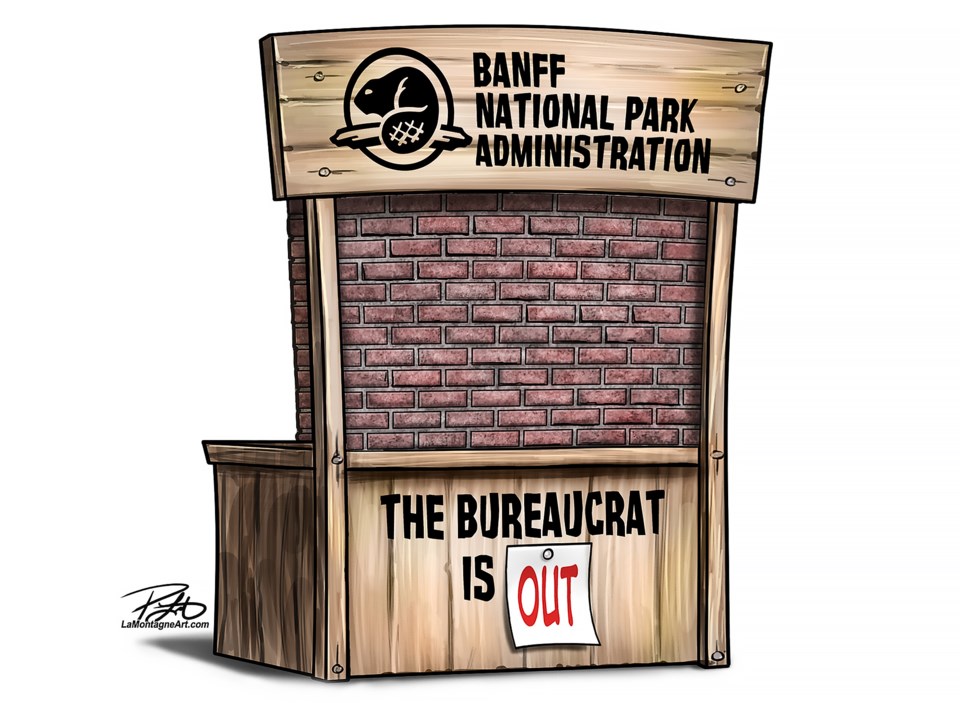Public institutions are designed to be forthcoming with information and open to the people they are designed to serve.
Aspects such as ongoing legal disputes and contract negotiations are often done behind closed doors until finalized, but the intent of a public organization is to be just that – public.
Anything less is an insult to taxpayers who fund their operations and a failure of leadership.
In recent months, Parks Canada – particularly Banff National Park’s field unit – has introduced a veil of secrecy that would make the Stephen Harper government envious and shed a tear out of pride.
The latest example is Banff National Park’s field unit lack of transparency in releasing little to no information on a mamma black bear and cub being relocated and killed after they returned to Banff to feast on fruit trees and garbage.
The issue of bear relocation and euthanization is always top of mind for Bow Valley residents, but much more so in recent weeks.
In what could be a prime opportunity to educate people on the ultimate costs of not following recommendations of living in an area with an abundance of wildlife has turned into another failure of the senior bureaucrats to gatekeep the message at the expense of potentially endangering both humans and wildlife.
The matter of controlling the message is one that is only growing, much to the dismissiveness of the public good, particularly as social media has made communication easier than ever. And on a near daily basis, the top bureaucrats of the Banff field unit are becoming more unresponsive to public needs.
The difficulty at the federal level is not without precedent, of course.
During Stephen Harper’s leadership, it was well-known scientists and experts were consistently muzzled and blocked from speaking publicly. The Information Commissioner of Canada completed a lengthy investigation that found the lengths to which experts were essentially locked in backrooms to remain out of sight, out of mind.
Such examples included the then Minister of Natural Resources personally having to give permission for a scientist to speak on a flood that happened 13,000 years ago, despite the research having been publicly published. Another was 11 federal government employees and more than 50 emails on how to answer a question on a Canadian government scientist's role in a NASA team studying regional snowfall patterns.
Other examples had government communications staff providing experts scripts on what to and not say on their own research they had developed over decades in the field and federal officials providing information claiming to be from scientists and experts, despite it coming from top level bureaucrats.
The Justin Trudeau government came to power in 2015 and repeatedly stated experts and scientists would be available to speak on research and other topics such as public safety, while “government and its information must be open by default.”
However, as is common with most governments, those vows and promises get shuffled and lost in the hope no one will notice.
The issue, of course, is indicative of the ongoing problems when it comes to information across the country. The access to information system in Canada is in ashes, as legislation has been outright changed to enforce information to be kept secret.
The Centre for Law and Democracy keeps an ongoing global right to information (TRI) rating, with Canada coming in at a score of 93 out of a possible 150.
That’s above the United States and several western European countries, but behind countries such as Russia, Colombia and most of the former Yugoslavia nations – all of which are unlikely to be considered bastions of democracy.
Alberta, without surprise, comes in tied for last among provinces and territories.
The issue, however, is a greater overarching theme of an erosion of the ability of the public to receive timely information from a publicly funded organization such as Parks Canada.
As an organization, its role is vital in connecting to millions of people across the world on an annual basis.
The role of the public sector is ultimately to act in the best faith of the public good.
By this measure, Parks Canada is failing a key aspect of its core mandate.




